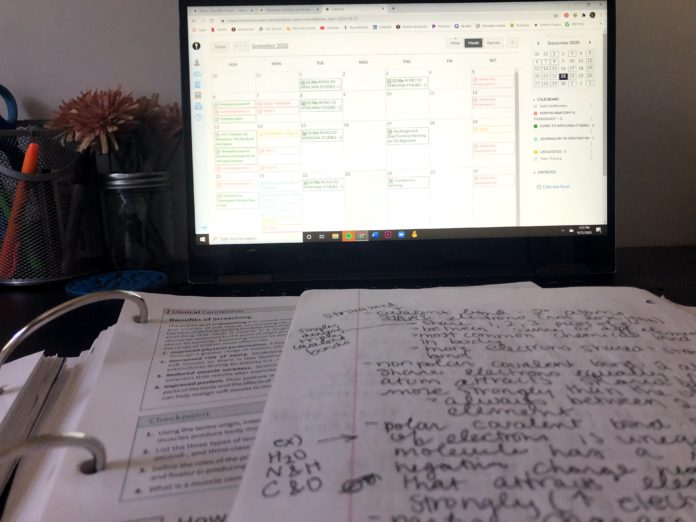
The impacts of COVID-19 have been felt in every aspect of our lives.
Most schools are operating virtually or in a hybrid format and social events are either non-existent or restricted due to capacity limits or meeting format, as well as countless other minute changes that have been made to our daily routines that we may not have recognized as constants before the pandemic struck early this year.
With so many alterations to what we’ve generally taken for granted up until this year, it’s hard to see anything but the negatives. Seniors who were looking forward to living their social life to the fullest during their last undergraduate year are bummed knowing they are unable to go to any sort of physical social gathering without putting themselves and their friends at risk of contracting the novel coronavirus.
The same goes for freshmen who have been longing to experience college for the first time and are missing out on all the things they thought they would get to do after leaving high school.
Academically, online classes just aren’t the same as an in-person learning environment. Even if you have classes that meet over Zoom, you just don’t get the same interaction with professors and classmates as you would in a classroom.
It would seem that all these temporary adjustments from the way we’re used to living our lives left us feeling like we’re missing out on something, lacking a certain je ne sais quoi. Quite frankly, coronavirus has put a damper on everything, especially with the state we’ve been living in — self-isolation, quarantine and social distancing — lasting much longer than we’d originally hoped.
When we look back to the present from a future we can’t even imagine yet, one where COVID-19 doesn’t even make us bat an eye, we will think about what we did when faced with a pandemic — as individuals and as a community. Would it be sufficient in the eyes of our future selves to know that we sat around waiting for it all to end with a negative attitude? Would we be proud of that?
Our assumption is no, we would not be proud. Rather, we would probably think about how much time we wasted waiting for something to happen — or stop happening, in this case — when we had no idea when that would occur.
Instead, we should seize this moment and live it as fully as we can. This isn’t to suggest that those seniors and freshmen should go out and party on the weekend regardless of the consequences. We should still follow medical advice and guidelines as put forth by experts around the world and in the U.S. However, it would be foolish not to take advantage of our situation.
As students, we can use this time to adapt and build our skills for the professional world. When classes moved online in the spring, it was a learning curve for everyone. Since each individual professor chose a different format, students had to adjust not only to remote learning, but to each of their professor’s selected teaching formats for the remainder of the semester. Changes like this presented us with obstacles that have ultimately equipped us with new skills we can put into practice in our future careers.
In the professional world, this trial and error of working in a virtual format has given students the opportunity to learn how to adapt to different working environments. Going forward, learning to adapt quickly will be something that employers will value in an employee, especially in an industry where thinking quickly on your feet is an advantage.
Take, for instance, education majors who spent five days a week their final semester working with students in a real classroom environment — that is, until COVID-19 forced a move to remote learning. Such a shift required full-time teachers and their assisting college students to create a plan to keep the children’s education as effective as it would be in person. The swift change helped prepare the soon-to-be grads for their teaching careers, which requires even in ordinary circumstances the adaptation of teaching methods so that every student can comprehend the lessons.
Now, as they start their careers still in the midst of a pandemic, they are able to apply what they learned when teaching went remote in the spring to help their own students to the best of their ability.
From a faculty perspective, professors had to convert their curricula to formats suitable for the internet and decide how their courses would run. Would they do live video classes? If yes, what program should they use? Should they instead run the remainder of the semester asynchronously? These decisions were based on individual preferences of professors, which allowed space for them to find what remote methods worked for them. Like students, faculty still needed to adapt to this change.
For “The Whit,” remote publication was — and continues to be — a challenging process. New concerns to consider develop every day and we encounter new methods of production to explore just as often. Not having a face-to-face interaction with the other staff members can obstruct clear communication, and I’m sure this is the case for any group trying to collaborate during this time. But, like the last two groups, we have adapted and we persist in our efforts to be a reliable source of information for the Rowan community.
New and improved professional skills aren’t the only thing we can take away from this pandemic. We may have even found better, more effective and efficient ways to accomplish our normal tasks. Meeting remotely for a club or another organization may lack the personality and feeling of an in-person meeting, but is it really a loss to have a club meeting online for an hour when it would normally take you 15 minutes to and from the meeting location plus that hour? That’s an extra 30 minutes to dedicate to something else, whether it’s homework, self-care, professional development or even just unwinding and spending time with your family or roommates.
Though COVID-19 has certainly put constraints on our lives and given some people a tremendous amount of grief and pain, we should try to push on the best we can. We should take advantage of the novel opportunities presented to us to improve ourselves and our communities.
For comments/questions about this story, email editor@thewhitonline.com or tweet @TheWhitOnline.




